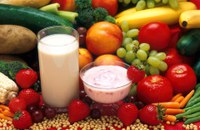Prairie Fare: These Health Questions Could Save Your Life
(Click the image below to view a high-resolution image that can be downloaded)
By Julie Garden-Robinson, food and nutrition specialist
NDSU Extension
“What did that mean?” my husband asked. He sounded a bit surprised.
As we drove down the street, we saw the electronic billboard at the same time.
I believe the sign said, “Let’s Start a Bowel Movement.”
“That was clever, wasn’t it?” I remarked.
He glanced in my direction. I think he finds me a bit strange some, if not most, days.
“March is National Colorectal Awareness Month. That billboard got our attention with its play on words,” I added.
As a nutrition specialist, I want people think about the foods and beverages they consume and their influence on health. Digestion is part of the nutrition equation, as is elimination and bowel health. “Colon” is another word for the large intestine or large bowel.
I recall an earlier attention-getting campaign about colorectal cancer with the tagline, “Don’t die of embarrassment.”
Sometimes people do not seek medical treatment, because they are embarrassed to talk about symptoms.
Colorectal cancer is the fourth most common cancer and second in terms of cancer deaths. Chances are, you know someone or perhaps directly experienced colon cancer. You may know people lost their lives to colon cancer.
Cancer is a disease where our body cells grow out of control.
These are some of the risk factors that could be linked with colon cancer according to the Centers for Disease Control and Prevention (CDC). Ask yourself these questions. “Yes” answers mean you may be at greater risk.
- Are you 45 or older? If you are, have you been screened for colorectal cancer yet? The age for a colon cancer screening was reduced from 50 to 45 in recent years. Discuss screening options such as a colonoscopy or stool test with your healthcare provider.
- Do you have a family history of colon cancer? If you have a family history, your provider may suggest that your screening begins 10 years before the age the family member was diagnosed.
- Do you have inflammatory bowel disease, such as Crohn’s disease or ulcerative colitis? These conditions place you at a greater risk.
- Have you noticed a change in bowel habits, such as diarrhea or constipation that is not normal for you? Do you have blood in your stool? Do you have abdominal pain or cramps that don’t go away? Ribbonlike or narrow stools could indicate a blockage from a tumor. Let your healthcare provider know you are having issues.
As with many diseases, our lifestyle plays a role in modifying our risk for colorectal cancer. Next, ask yourself these questions. “Yes” answers mean you are taking steps to reducing your risk for colon cancer.
- Do you get regular physical activity, such as walking? Aim for at least 30 minutes of physical activity most days of the week. You can accumulate it in 10- to 15-minute increments. Be inspired by the warmer weather of spring and get outdoors and walk around. Yardwork counts as physical activity.
- Do you eat at least 4 1/2 cups of fruits and vegetables every day? Nutrition experts advise that we fill half of our plate with fruits and vegetables of all colors. Any fruit or vegetable whether canned, fresh or frozen counts toward the total.
- Do you eat plenty of fiber-rich foods? Any type of bean, lentils, split peas, plus fruits and vegetables are rich in fiber.
- Do you get enough calcium in your diet? Milk and yogurt are among the excellent natural sources of calcium. Researchers have shown adequate calcium may lower your colon cancer risk.
- Are you at a “normal weight” according to a healthcare provider? By getting more exercise and modifying your diet, you may bring down the number on the scale.
- Do you avoid smoking and/or drinking alcohol? Both alcohol consumption and tobacco use are linked with several types of cancer. The more you drink the more you increase your cancer risk. Tobacco use can cause cancer almost anywhere in the body.
Use spring as a “springboard” to a healthier lifestyle. Consider setting some goals, and tackle one item at a time. See www.cdc.gov/cancer/colorectal/ to learn more about colorectal cancer.
Here’s a fiber-rich recipe to get you started. Visit www.ag.ndsu.edu/food for more information, including nutrition newsletters delivered to your email on a monthly basis.
Mediterranean Bean Salad
1 (15 1/2-ounce) can beans (Great Northern, navy or white kidney), drained and rinsed
1/2 cup sun-dried tomatoes, cut into strips (or substitute chopped fresh tomato)
1/3 cup sliced black olives, drained
1/3 cup fat-free or reduced-fat feta cheese, crumbled
1/3 cup red onion, finely chopped
2 cloves garlic, finely minced
2 tablespoons fresh cilantro, chopped, optional
2 tablespoons olive oil
2 tablespoons lemon juice
Fresh ground pepper (to taste)
Drain and rinse beans. Combine all ingredients in a bowl and mix thoroughly. Try these serving suggestions: Serve on a lettuce leaf with grilled flat bread, tossed with pasta, in a pita pocket sandwich, on top of tossed salad or with whole-grain chips or crackers.
Makes six servings. Each serving has 150 calories, 7 grams (g) fat, 5 g protein, 16 g carbohydrate, 5 g fiber and 200 milligrams sodium
(Julie Garden-Robinson, Ph.D., R.D., L.R.D., is a North Dakota State University Extension food and nutrition specialist and professor in the Department of Health, Nutrition and Exercise Sciences. Follow her on Twitter @jgardenrobinson)
NDSU Agriculture Communication – March 24, 2022
Source: Julie Garden-Robinson, 701-231-7187, julie.garden-robinson@ndsu.edu
Editor: Elizabeth Cronin, 701-231-5391, elizabeth.cronin@ndsu.edu


